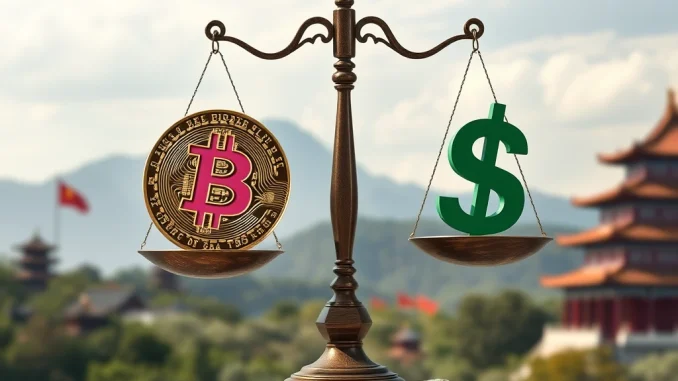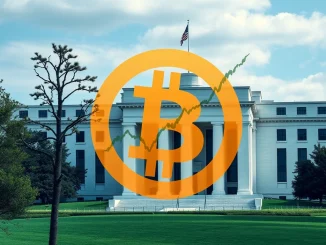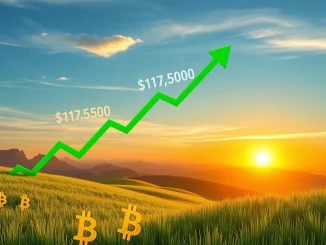
In a development capturing significant attention within global financial and cryptocurrency circles, a Chinese government-affiliated think tank has reportedly evaluated the potential role of Bitcoin. The focus? Bitcoin as a strategic asset, specifically considering its use as a reserve and a potential countermeasure against existing U.S. dollar hegemony.
Why is a Chinese Think Tank Looking at Bitcoin as a Reserve Asset?
The U.S. dollar has long held a dominant position in global finance. It’s the world’s primary reserve currency, used for international trade, debt, and held by central banks globally. This dominance, often termed U.S. dollar hegemony, provides significant economic and political advantages to the United States.
According to reports originating from Solid Intel on X, this particular Chinese think tank believes that the leading cryptocurrency, Bitcoin, warrants continued attention. Their evaluation seems to stem from a desire to explore alternatives or hedges against the prevailing dollar-centric system.
Considering a digital reserve asset like Bitcoin reflects a broader global trend where nations and institutions are exploring diverse asset classes beyond traditional fiat currencies and gold. The motivation often involves diversifying risk, seeking uncorrelated assets, or positioning for potential shifts in the global economic order.
Bitcoin as a Potential Countermeasure: How Could That Work?
The idea of using Bitcoin as a countermeasure against U.S. dollar hegemony isn’t new in theoretical discussions, but its consideration by a government-affiliated body in China lends it new weight. Here’s a look at the potential reasoning:
- Decentralization: Bitcoin operates independently of any single government or central bank, including the U.S. Federal Reserve. Holding Bitcoin means holding an asset not directly subject to U.S. monetary policy, sanctions, or control.
- Limited Supply: With a fixed supply cap of 21 million coins, Bitcoin is often compared to digital gold. This scarcity contrasts with fiat currencies, which can be printed potentially infinitely, leading to inflation.
- Borderless Transactions: Bitcoin can be sent and received anywhere in the world without relying on traditional banking infrastructure, which is heavily intertwined with the U.S. dollar system.
- Alternative System: Building reserves in Bitcoin, even partially, could be seen as contributing to an alternative financial ecosystem that operates outside the direct influence of the dominant dollar system.
While these characteristics make Bitcoin theoretically interesting as a hedge or alternative, they also come with significant challenges.
Challenges and Risks of Bitcoin as a Reserve Asset
Despite the potential appeal as a Bitcoin countermeasure, the asset presents substantial hurdles for official reserve holdings:
- Extreme Volatility: Bitcoin’s price is notoriously volatile compared to established reserve assets like the U.S. dollar, Euro, or gold. This makes its value unpredictable for long-term stability required by reserves.
- Regulatory Uncertainty: The regulatory landscape for Bitcoin and cryptocurrencies remains fragmented globally. Major powers, including China itself, have taken strict stances against aspects of crypto.
- Security Risks: Managing private keys securely for large reserves presents complex technical and operational challenges.
- Scalability and Transaction Speed: While improving, the Bitcoin network’s capacity and speed are limited compared to traditional payment systems handling large-scale international finance.
- Energy Consumption: The environmental concerns related to Bitcoin’s proof-of-work mining could be a public relations and policy issue for official adoption.
These factors mean that while Bitcoin deserves attention, transitioning it into a significant reserve asset for a major economy is a complex and risky undertaking.
What Does ‘Deserves Continued Attention’ Really Mean?
The phrasing suggests that the think tank’s view is not an immediate call to action but rather a recommendation for ongoing research and monitoring. It implies recognition of Bitcoin’s unique properties and potential geopolitical implications, without necessarily endorsing it as a ready-to-use reserve asset today.
It signals that major global players are seriously considering how digital assets, including decentralized ones like Bitcoin, fit into the future of global finance and power dynamics. It’s a strategic foresight exercise, acknowledging that the landscape is changing.
Comparing Bitcoin to Traditional Reserve Assets
How does Bitcoin stack up against the usual suspects in the reserve asset world?
| Asset | Primary Strength | Primary Weakness | Relevance as Reserve |
|---|---|---|---|
| U.S. Dollar | Liquidity, Stability (relative), Global Acceptance | Subject to U.S. policy, Potential inflation | High (Current dominant) |
| Gold | Store of Value, Tangible, Historical Reserve | Yields nothing, Storage costs, Price volatility | High (Traditional reserve) |
| Euro | Major Economy Currency, Liquidity | Subject to Eurozone policy, Less dominant than USD | Medium (Major reserve) |
| Bitcoin | Decentralization, Scarcity, Borderless | Extreme Volatility, Regulatory risk, Security risk | Low (Emerging consideration) |
This table highlights why, despite its unique advantages as a potential Bitcoin countermeasure, Bitcoin is still far from being in the same league as established reserve assets in terms of stability and widespread acceptance among central banks.
The Geopolitical Angle: Bitcoin and US Dollar Hegemony
The interest from a Chinese think tank underscores the geopolitical dimension of digital assets. As global powers navigate trade tensions, currency fluctuations, and the desire for strategic independence, exploring alternatives to the dollar system becomes relevant.
While direct, large-scale adoption of Bitcoin as a state reserve by China seems improbable in the short term given their domestic crypto stance, the analysis itself is significant. It indicates that Bitcoin’s existence and characteristics are being studied at high levels as part of broader discussions about economic security and international financial influence.
Conclusion: Bitcoin Deserves Attention, But for Whom and How?
The report from the Chinese government-affiliated think tank serves as a powerful reminder that Bitcoin’s implications extend far beyond individual investors or technological enthusiasts. Its properties as a decentralized, scarce digital asset are being examined within the context of global power dynamics and the future of reserve currencies.
While the challenges are significant and immediate large-scale adoption as a state reserve remains unlikely, the fact that a major economy’s think tank believes Bitcoin deserves continued attention is notable. It positions Bitcoin not just as a speculative asset, but as a technology with potential geopolitical relevance in a world looking for alternatives or hedges against established systems like U.S. dollar hegemony. This ongoing evaluation highlights Bitcoin’s growing recognition on the world stage, even among entities traditionally skeptical of decentralized cryptocurrencies.



